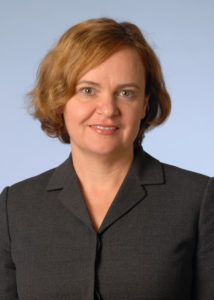
Northwestern Medicine investigators have discovered that a particular enzyme is essential for regulating cancer cell survival and metastasis under cellular stress, findings that were published in the Proceedings of the National Academy of Sciences.
The study, led by Daniela Matei, MD, the Diana, Princess of Wales Professor of Cancer Research and chief of Reproductive Science in Medicine in the Department of Obstetrics and Gynecology, also suggests that targeting this enzyme in combination with dietary interventions may be a promising treatment strategy for cancer.
Fatty acids, or lipids, act as an alternative energy source for cancer cells when glucose and oxygen are limited in the tumor microenvironment. To maintain proper intracellular functioning, including cellular signaling and lipid storage, saturated fatty acids are converted into unsaturated fatty acids by an enzyme called stearoyl Co-A desaturase (SCD). This “desaturation” is the final step of lipogenesis, the process of converting metabolites into fatty acids and energy.
While it is known that SCD is essential for maintaining lipid balance in cancer cells, how it influences cancer cell survival and tumor progression has remained poorly understood. However, previous work from the Matei laboratory established that cancer stem cells are enriched in unsaturated fatty acids and that targeting SCD eliminated cancer stem cells.
Taking their findings one step further in the current study, the investigators used transcriptomics, lipidomics and single-cell imaging to uncover how SCD regulation of fatty acids impacts the survival of ovarian cancer cells.

They found that inhibiting or depleting SCD entirely decreased the amount of unsaturated fatty acids in the cancer cells, tipping the balance towards saturated fatty acids. In contrast, increased levels of unsaturated fatty acids protected cancer cells from cellular stress triggered by the endoplasmic reticulum (ER), a network of tubules in the cytoplasm that transports proteins and lipids throughout the cell.
“The balance between saturated and unsaturated fatty acids is very important in maintaining the integrity of the endoplasmic reticulum. So, if there are too many saturated fatty acids, the cell will die, but the unsaturated fatty acids act like a buffer,” said Matei, who is also a professor of Medicine in the Division of Hematology and Oncology and a member of the Robert H. Lurie Comprehensive Cancer Center of Northwestern University.
Next, using ovarian cancer xenograft models, the investigators found that inhibiting SCD blocked tumor growth in vivo. Additionally, combining an SCD inhibitor with a diet enriched in saturated fatty acids in in vivo models of ovarian cancer initiated the ER stress response and prevented tumor progression.
The findings reveal that SCD is a key regulator of cancer cell fate under metabolic stress and that targeting the lipid balance in cancer cells may be an effective therapeutic strategy, according to the authors.
“Given the plasticity and redundancy of metabolic pathways, which have by and large thwarted prior attempts to use metabolic interventions to target cancer, our results highlight the importance of combination strategies,” said Guangyuan Zhao, a student in the Driskill Graduate Program in Life Sciences (DGP) and lead author of the study.
This work was supported by grant RO1CA224275, grant R33CA223581 and National Science Foundation grant CHE1807106.






